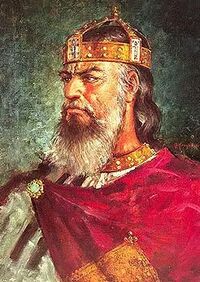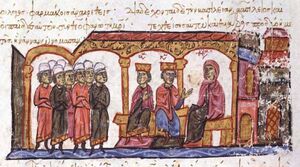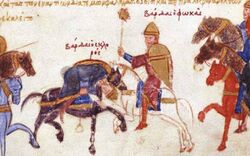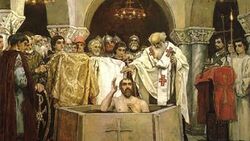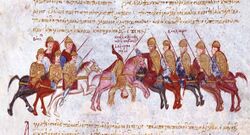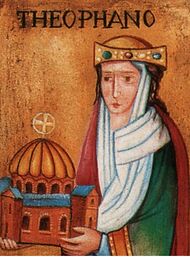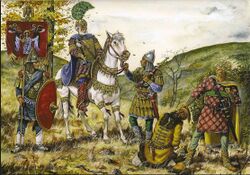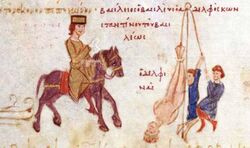Basil II
“I don't like women. They moan about my dirty boots.”
Mention Basil II in a bar in Sofia, Bulgaria, and there is a good chance you will exit it head-first and minus some teeth. Historians consider Basil an effective Byzantine emperor, but Bulgaria would try him for war crimes if he returned today. His nickname, Basil the Bulgar Slayer, provides a clue.
Family background[edit]
The future Bulgar slayer was the eldest son of Romanos II and his deadly wife Theophano, a former tavern girl with a strong ruthless streak even when patrons left ample tips. It was the tradition to crown a royal child co-emperor without regard to ability to govern, and Basil got his title whilst still in his cradle. When he was barely four years old, Theophano had Romanos killed. Whether it was a domestic argument that got out of hand or a fear that Romanos would divorce her, Theophano got her daggers in first. Theophano briefly ruled the empire on behalf of baby Basil and his younger brother Constantine VIII, who had also become co-emperor shortly before Romanos's demise. Theophano thought her boys still required a father figure so chose to marry an ugly general named Nikephoros Phocas, who thus became emperor Nikephoros II.
From crusty Nikephoros, Basil learned to love all things military. The young emperor loved nothing more than hanging around the barracks, working up a sweat with extensive swordplay. He had no time for women and never married. This could suggest Basil was homosexual, but he never had male favourites either. If the empire required heirs, he would leave that to Constantine VIII. This turned out to a good compromise, as the brothers avoided the fratricides that neigbouring states practised with regularity.[1]
Running the show without outsiders[edit]
However, they did not avoid step-patricides. In 969, Nikephoros was bashed to death in court intrigue involving Theophano and her new beau, John Tzimiskes, who was crowned emperor John I. In a devious act of double-dealing, John banished Theophano and exiled his co-conspirators. However, he did not advance to quadruple-dealing, and both Basil (now aged about 12) and Constantine were spared both being deposed and having their testicles deposited in a jar.
John's reign lasted until 976 when he was felled by a dodgy ticker. Basil was now 12 and still technically a child. No bother he thought, he could rule the empire With Constantine. They agreed to recall their mother. Theophano was moved from her convent and housed in her in her own wing of the imperial palace. This wasn't much concern for Basil, as he was counting on quality time far away from Constantinople, where the Phokas family were still keen to avenge the death of Nikephoros.
Two Basils and two Bardas(s)es[edit]
Closer to power was another Basil, Basil Lekapenos. He was a bastard son of Romanos I and thus Basil II's cousin. He was a relic of an earlier age, a member of the Lekapenos mob that had wrapped around the imperial family like bindweed and were enemies of the Phokas clan. He was a handy ally for an inexperienced emperor — and unable to become the emperor himself, as he had been castrated. This served not as punishment but promotion; he had been the Byzantine Empire's chief minister since 947. Emperor Basil kept him in the post.
Basil II had inherited an important prisoner in the shaggy shape of Bardas Phokas. The latter had proclaimed himself emperor in 969 when his uncle Nikephoros Phokas had been assassinated. Bardas lost out to John Tzmiskies. The punishment for an unsuccessful putsch was to lose one's testicles, eyes, or life, but John merely exiled Bardas to an island jail. Bardas had been a successful general, so perhaps John wanted to keep him in reserve. But Byzantine "law" gave Basil the right to change the punishment or just assassinate Bardas outright. Consequently, Bardas executed a jailbreak, helped when the chief minister Basil Lekapenos arranged for the jailers to go on extended lunch break whilst the jailbird flew.
Lekapenos's decision to spring Phokas was an attempt to deal with another rebel called Bardas. This was Bardas Skleros. He was the general who had beaten Phokas earlier and put him in jail. Skleros had rebelled in 976, apparently believing that he deserved to be a senior co-Emperor to Basil and Constantine. When they declined to make room for Skelros's hairy arse on the throne, the easily offended general had proclaimed himself emperor anyway and sent an army to besiege Constantinople. So when the released Bardas Phokas appeared on the Byzantine empire's border lands with the Abbasid Caliphate and waving his own flag of rebellion against Skleros, the latter turned his armies around and hunted for his rival, whom Phokas defeated in a single combat. Somehow Skleros was able to stagger back to his own army and eventually ended up in Baghdad as an honoured exile there. Emperor Basil was very disappointed that Skleros hadn't been delivered in chains. He was keen to re-imprison Phokas. Basil was opposed by his brother Constantine and more importantly Basil Lekapenos. As a mark of imperial favour Bardas Phokas was granted a ticker-tape parade in Constantinople to celebrate his triumph.
Send my sister to Russia[edit]
With the eastern frontier seeming settled, Basil turned his attention to the Bulgarians. Relations between Bulgaria and Byzantium had been punctuated with wars, peace treaties and marriages. Basil considered the situation intolerable. It blocked his ambition to regain the Balkans after centuries of disruption. This is where the infamous Byzantine diplomacy came in. Bulgaria bordered Hungary to the north and Russia (really Ukraine to be more accurate) to the northeast. Both were led by pagan rulers. Geza 'the Geezer' ruled as Grand Prince of the Hungarians and Vladimir Grand Prince of the Rus. Both rulers were already dabbling in Christianity. The Hungarians looked to the Latin west and Rome, whilst the Rus (Swedish in origin) were more inclined to the Greek ways of serving God. Neither Geza or Vladimir were Christians, but perhaps they could agree to be baptised? Money or a bride would help.
The hard-drinking Vladimir showed immediate interest and requested a mail-order bride from Constantinople. If also to make a point, Vladimir's army conquered a Byzantine outpost of Chersonesos in Crimea. In exchange for this, Vladimir would have to be baptised and recognise Christ. This seemed a small matter to Vladimir. He could promise anything; who would enforce any holy orders on him? With his typical brutish — if effective — behaviour, Basil sent his own sister Anna to Kiev. This was a big one-up on the last Greek wedding, when Holy Roman Emperor Otto the Great had seen his son and heir marry Princess Theophano (not the husband killing one) in the belief she was Basil's 'elder sister'. She wasn't.
The deeply reluctant Anna was sent to her new home with her usual luxuries and gifts. In 988, Vladimir and Anna married in a Christian church in Crimea — freshly whitewashed to hide the blood stains from the battle to take the city. Vladimir handed back Chersonesos and threw in a contingent of 6,000 his best troops. These formed the basis of the Byzantine Empire's crack troops, known as the Varangian Guard. They were recruited from Vikings and later on Anglo-Saxons and were personally loyal to the emperor. Basil liked that arrangement, especially when his old enemies, Bardas Phocas and Bardas Skleros, joined forces.
Rogues return[edit]
This re-emergence of an old problem of over ambitious generals had been in part-fueled by Basil's decision to demote and disgrace his adviser Basil Lekapenos. Convinced Lekapenos was up to his old tricks, the emperor confiscated everything off Lekapenos. This led to Phokas's rebellion and his surprising new ally. For a moment it seemed Basil was in big trouble. After taking much of Anatolia off the empire and re-proclaiming his own imperial rights, Phokas confronted Basil's main army at Chrysopolis. The sight of the emperor's new blond recruits with their huge double side axes seems to have triggered off something in Phokas's temper. Angry that Basil was using 'barely civilised soldiers' to defend himself, Phokas worked himself off so much he had heart attack and dropped dead off his horse. The rebel army fled the battlefield. Phokas's head was chopped off by a Varangian axe and carefully packed, sent to Constantinople to show that the old rogue was dead. One Bardas down. One to go.
Bardas Skleros wasn't present on the decisive battlefield. He and Bardas Phokas had fallen out before to the extent Skleros was in prison when his rival died. No problem. The rebels released him and once again Skleros was a rival emperor to Basil. However the old soldier had little fight in him left. In around 990 Skleros surrended. His life was spared but it was goodbye to his eyeballs. Skleros died a year later. Emperor Basil had finally defeated his internal rivals.
Relations with the West[edit]
Early in Basil's reign, it appeared the Holy Roman Empire was going to be the big problem for the Byzantines. Emperor Otto II (son of Otto the Great) wanted to conquer all of Italy for his empire. In this, he was supported by his Greek wife Theophano. She suspected her namesake dowager, empress Theophano and mother of Basil, had lethally Mickey-Finned emperor John I in 976. Theophano (the one in Germany) was therefore a supporter of Bardas Skleros[2]. This suited Otto too. With Basil busy in the east of his empire, the Germans rolled over the southern semi-independent statelets of Italy. In desperation, Basil allied with the Muslims of Sicily (normally a mortal enemy to the Byzantines) against Otto. The over-excited German chased that challenge but was thoroughly beaten by a Muslim army at the Battle of Stilo in Calabria. Otto survived the battle but died shortly after from malaria.
The new emperor, Otto III, was barely three years old. This would have normally lead to a deadly tussle for power but regent Theophano took control. She quickly showed that she could do more than teach table manners to her rowdy subjects and their brutish overlords. The change in emperor and the apparent end of the rebels against Basil encouraged a new detente betweem the Germans and Greeks. The young Otto III was proud of his mixed heritage and keen to revive the ancient Roman Empire, perhaps setting up a revised version of it as it operated in the 4th and 5th century with emperors in Constantinople and Rome. To seal the deal, Otto wrote to Basil about marrying one of his nieces. Leaving his brother Constantine to make the necessary arrangements, Princess Zoe (later empress Zoe) was sent to Italy to meet her intended husband. Zoe was eager to travel and got as far as Bari. There she was informed that Otto III had died suddenly. It may have been malaria, though another source suggests Otto was poisoned by a woman in revenge for his involvement in surpressing a rebellion in Rome. Zoe returned home. Since the Holy Roman Empire was in its usual succession turmoil, Basil judged he had no need to engage with the West anymore. He was now more prepared than Fred Sanford for the 'big one': in Basil's case, the breaking of Bulgaria.
Bulgaria is no more[edit]
The Bulgarians had come a long way in the previous two centuries when one of their kings had used the body of a dead Byzantine emperor to create a bone dinner service. They had taken the Christian wafer from the Greeks rather than the Pope in Rome and had intermarried with the Lekaponi imperial family in the 9th century. But the Bulgarians felt they were in a vice. Hungary to the north and the recently arrived Pechenegs in Romania. Both were keen to be 'bought' against the Bulgarians. In 993 the new Bulgarian leader Samuel re-claimed the title of 'Tsar' (i.e. Emperor) of the Bulgarians which had lain dormant for some years. There had been a 'Great Uncle Bulgaria' but he had moved to London to pickup Anglo-Saxon litter.
Samuel was a successful Bulgarian general and had been eased into the succession when the King Roman had died without heirs (or graces) in 993. In 997 Samuel re-titled himself as Tsar Sam the Man. Emperor Basil took this as a threat especially as Bulgaria had gone on expansion drive in the Balkans. The war was a tiresome story of raid and counter raid with a battle here and a siege there to keep the scroll chroniclers busy. Basil eventually chose a ruthless revenge to end the war. In 1014 after defeating a Bulgarian army at Kleidon Basil decided to blind 15,000 captured soldiers. Only one out of every 100 was allowed to keep one eye (they were given a choice of which one). When they managed to find their way back to Samuel his ticker exploded in shock and he died. For this collective punishment on the Bulgarians Basil got his nickname of Boulgaroktonos or Bulgar Buggerer. Four years later Bulgaria was conquererd. This restored the River Danube as the northern border of the Byzantine Empire for the first time since the late 6th century.
Other wars[edit]
Since the only thing Basil liked was killing people you won't be surprised he had plenty of wars to fill in his spare time. The Syrian border was secured against any attempt by local muslims to move the border back towards Anatolia whilst the Georgians were punished for supporting the rebel Bardas Phokas and Bardas Skleros earlier. Since the Armenians were allies of the Georgians, they got the sharp end of Basil's sword as well despite being fellow christians, if not mainstream. All these wars were costing money so Basil proposed a special tax on the wealthy. Few people were keen to argue with Basil on that issue (not when he bloody big army at his back) so reluctantly complied. The rich pinned their hope that a successor to Basil could be lobbied to change this in future.
Death[edit]
In 1025 Basil was planning another of his military 'holidays'. This time it was to be in Italy and then a reconquest of Sicily from the muslims. It was not to be. Barely after getting his war suitcases packed, Basil dropped dead. He was 68.
References[edit]
| Preceded by: Romanos II |
Byzantine Emperor 963–1025 |
Succeeded by: Constantine VIII |
